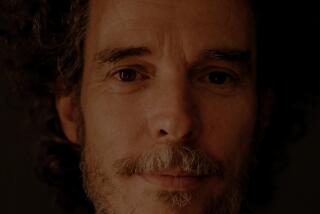Book Review : Recipes for the Making of Zombies
- Share via
The Serpent and the Rainbow by Wade Davis (Simon & Schuster: $17.95)
A fundamental problem plagues this book. At the “public,” or external level, it manifests as a quirk of merchandising: the author, Wade Davis, is touted on the jacket copy as “a real life Indiana Jones” and as “a Harvard ethnobotanist who penetrated the dark world of Haitian Vodoun as no other outsider before.” Davis’ “mission” is funded by David Merrick, the Broadway producer (?!). The show-biz, dazzling adventure, swing-in-and-out-of-weird-ceremonies-by-ropes-made-out-of-vines syndrome is very much in evidence here.
Wade Davis’ assignment is to go to Haiti and explore “the frontier of death.” Two mysterious men in New York tell him all this, and hand him a sealed envelope. (Would it have self-destructed had Davis chosen not to go on this mission?) The project, “the most important assignment of my career,” Davis opines, is, again, to fly down to Haiti, find a couple of documented zombies, and, as the men in New York say, “ ‘What we want from you, Mr. Davis, is the formula of the poison.’ The bluntness of his statement, however expected, pushed me back from the table, and I . . . felt myself caught like a fly in the cross mesh of their gaze. . . .”
Flaw Revealed
Naturally, Davis takes the sealed envelope (which has a picture of a zombie, Clairvius Narcisse, in it). And we begin to see another manifestation of this fault or flaw that runs through the book.
From time to time in “The Serpent and the Rainbow,” Davis writes like a poor man’s Lowell Thomas or T. E. Lawrence or Adm. Byrd. He is very much the professional adventurer. People keep telling him things like “Haiti will teach you that good and evil are one. We never confuse them, nor do we keep them apart.” Or he himself observes, “In the West we cling to the past like limpets. In Haiti the present is the axis of all life. As in Africa, past and future are but distant measures of the present, and memories are as meaningless as promises.” Or, again, talking about the Haitian girl who takes him around the island, “She had a hundred precocious ideas, and some were good and true, but they could never be hers until she found them alone, for ideas are but words unless they are sown in experience.” This is cocktail party profundity of the very worst sort, the kind that makes you head for the punch bowl while calling brightly over your shoulder, “Thank you for sharing your fascinating zombie stories with me, Mr. Davis! I’ll always cherish your tales of ‘Voodoo death!’ ”
But the other side of all this is that the material presented here is fascinating; Mr. Davis does know what he is talking about, and once he gets over his case of purple prose and begins to write in a reasonable manner, what he has to say, and even how he says it, is terrific.
History of Poisons
The chronology here is straightforward. Davis comes down, takes a look at the zombie, Clairvius Narcisse, who certainly “isn’t himself.” (A smart-mouthed priest asks Davis “ ‘If you were a woman, would you ask him to dance?’ ”) Davis buys a false poison, which he can see , even as it’s made, is harmless, and then finds the genuine article. He’s present at the exhumation of a child’s grave, and stands around as they (the houngans or Vodoun priests) cook its bones to charcoal.
What happens to a zombie, or a soon-to-be zombie, is that this poison is applied topically to him. He falls into a death-like trance, is buried, then brutally reawakened, “baptized” with a new name, taken to another part of the island, where, because of extreme brain damage, he does nothing but work and live the life of a vegetable. Again and again, Davis makes the point that people in Haiti are not terrified of zombies, they’re afraid of becoming zombies.
The questions beyond how many newts do you crush in the mortar--the real questions--are, of course, why do Haitians pursue this strange “art?” Of what does the religion of Vodoun consist? What part does it play in a supposedly Roman Catholic society, and so on?
Here is where Davis forgets that he’s supposed to be Indiana Jones and goes back to being a regular Harvard scholar. Haiti is a land of ex-slaves, he reminds us, a place that had the only successful slave revolution, a place where the slave mentality, and fear of slavery, still persist; and the zombie is the quintessential slave.
All this material is wonderful, in itself. Davis was heroic in bringing it to light. One would only suggest to him that you don’t have to write like a big silly to get your points across. His adventures speak--once they get the chance!--for themselves.
More to Read
Sign up for our Book Club newsletter
Get the latest news, events and more from the Los Angeles Times Book Club, and help us get L.A. reading and talking.
You may occasionally receive promotional content from the Los Angeles Times.







